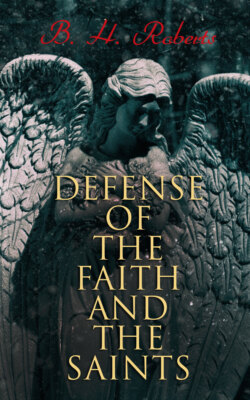Читать книгу Defense of the Faith and the Saints - B. H. Roberts - Страница 23
На сайте Литреса книга снята с продажи.
ОглавлениеVI.
"HOW."
Table of Contents
FOREWORD.
Table of Contents
The subject treated under this title, "How," is an address delivered in the Salt Lake City Tabernacle on Sunday, May 31, 1903, in one of the sessions of the Young Men's and Young Ladies' Mutual Improvement Associations Annual Conferences. The associations are auxiliary organizations in the Church of the Latter-day Saints for the improvement of the youth. In May of the above year, the General Assembly of the Presbyterian Church was appointed to convene in Los Angeles. A large number of ministers of this persuasion from eastern states made it a point to pass through Salt Lake City en route for Los Angeles, and the Ministerial Association of Utah, an organization comprised of Protestant ministers of all the Evangelical Churches in the State, made it their business to call the attention of such visiting ministers to the "Mormon Question," and invited their co-operation against the Mormon Church. As preliminary to this action on their part they published two pamphlets, one under the title, "Claims of Mormons to be Considered Seriously." This pamphlet pretended to give a brief history of the origin of the Mormon Church, and declared that the Prophet Joseph Smith was considered by his neighbors to be a character who was "low, unworthy, of bad repute in general, and that he was especially unworthy of confidence." It was a re-hash of the silly stories that sprang up in western New York and that are utterly unreliable, and which, while the Prophet lived in New York, could never be established against him, though every possible effort to do so was made.
The second pamphlet was entitled "Temple Mormonism." The chief purpose of this pamphlet was evidently to prove that Mormonism was an oath-bound secret organization, "for the encouragement and protection of polygamous living." These pamphlets were distributed to the one thousand Presbyterian ministers who are said to have passed through Salt Lake at that time. It was the intention also to have them presented to the Presbyterian Assembly in Los Angeles, and I believe they were so presented. Later they were to be presented to the Baptist Convention to be held that year in Buffalo, New York; also to the Congregational Conference at Portland, Oregon, and then to the W. C. T. U., to the Y. M. C. A. and W. C. A. conventions of that year; and finally to the Inter-Denominational Association of Women. Whatever became of the presentation of these pamphlets to the respective organizations other than the Presbyterian Assembly, I do not know; but their presentation to the gathered Presbyterian ministers at Los Angels doubtless had the desired effect, for it resulted in some very heated speeches upon the subject of Mormonism, more especially in one delivered by Dr. Charles L. Thompson of New York, secretary of the Assembly, who, in the course of a speech widely heralded through the secular press of the country, said—and this was the report of the speech according to the dispatches—of Mormonism:
"It is not to be educated, not to be civilized, not to be reformed—it must be crushed. No other organization is so perfect as the Mormon Church except the German Army. This describes Mormonism. Its empty promises deceive. Relentlessly it fastens its victims in its loathsome glue. It has one vulnerable point. It is not to be reformed. It is to be crushed. Dr. Richard L. Ely has declared that there is nothing comparable to its system except the German Army. * * * * Beware the Octopus. There is one moment in which to seize it, says Victor Hugo. It is when it thrusts forth its head. It has done it. Its high priest claims a senator's chair in Washington. Now is the time to strike. Perhaps to miss it now is to be lost."
Commenting on this speech, the dispatches said:
"No speaker who has thus far appeared before the Presbyterian General Assembly has aroused so much enthusiasm as Dr. Chas. L. Thompson. His references to Mormonism were especially bitter, and brought out great applause from his audience."
It is this speech that is commented upon in the remarks which follow.
